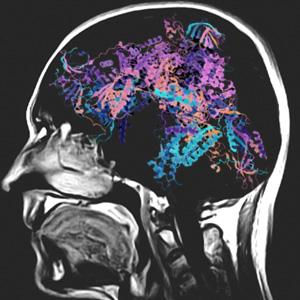A team of American and Canadian scientists lead mutation discovery

Credit: McGill University Health Centre
MONTREAL, February 25 2019–An international effort led by physician-scientists at Rady Children’s Institute for Genomic Medicine (RCIGM), in collaboration with a team at the Montreal Children’s Hospital of the McGill University Health Centre (MCH-MUHC), has identified the cause of a devastating pediatric brain disorder paving the way for the first step in developing potential therapies for this rare neurodegenerative condition.
Investigators performed advanced genetic tests on blood samples from seven children with neuro-development disabilities who were evaluated by doctors in San Diego, Montreal and Cairo. This led to the discovery of mutations in the VARS gene, which had not previously been linked to human disease.
“These children showed epileptic seizures and abnormalities evident on brain MRI scans,” said Joseph Gleeson, MD, director of neurodevelopmental genetics at RCIGM and professor of neuroscience and pediatrics at UC San Diego School of Medicine. “Although no treatment currently exists for this condition, the results are important as the first step in guiding research directed at targeted therapies.”
The genetic mutations identified in the study led to a defect in the enzyme responsible for generating proteins containing the amino acid valine which is necessary for cellular health. Genetic variations that damage these types of enzymes are associated with a variety of human diseases including microcephaly and neuropathy.
In this study, the team found that, enzymatic activity was significantly reduced in cells from the young patients. The findings suggest that children with this disorder may benefit from treatments to support the synthesis of new valine containing proteins in the brain.
For many children with genetic disabilities, the cause of their disease is rarely identified. This limits the ability of doctors to develop precise treatment plans. Researchers at RCIGM and at The McGill University and Génome Québec Innovation and Centre have pioneered the use of Whole Genome Sequencing to rapidly diagnose and guide medical management of rare childhood diseases.
Both whole exome and whole genome testing were conducted as part of this study. These tests search an individual’s genetic code for imperfections that are the source of disease.
“Trying new approaches to understand what these children have is important. Having an answer about what’s making their child so sick helps families grieve,” adds study co-author Geneviève Bernard, MD, MSc, FRCPc, pediatric neurologist at the Montreal Children’s Hospital of the McGill University Health Centre (MUHC) and a researcher with the Child Health and Human Development Program of the Research Institute of the MUHC. Dr. Bernard is also an assistant professor in the Departments of Neurology and Neurosurgery, and Pediatrics, at McGill University.
Patient evaluation and testing for this study was conducted at Rady Children’s Hospital-San Diego, Montreal Children’s Hospital of the McGill University Health Centre and the National Research Center in Cairo. Medical research institutions in Amsterdam, Hong Kong, Qatar and Egypt also played a supporting role in confirming the biologic impact of the mutation in the VARS gene.
“For ultra-rare conditions such as this one, collaboration among multiple research institutions is crucial to confirm that changes identified in the genetic code may be common to multiple children with similar clinical symptoms,” said study co-author Jennifer Friedman, MD, neurologist at Rady Children’s Hospital and professor at UC San Diego School of Medicine.
“Such cooperation and patient matching plays a critical role in the identification of new genes and provision of diagnoses to geographically dispersed individuals with the same rare disorder,” Dr. Friedman said.
In future experiments, the researchers hope to test whether dietary supplementation with valine or gene therapy may help to restore the altered protein in the brain of these children.
###
Results of the study were published in the journal Nature Communications under the title “Biallelic mutations in valyl-tRNA synthetase gene VARS, are associated with a progressive neurodevelopmental epileptic encephalopathy.” DOI: 10.1038/s41467-018-07067-3 https:/
About Rady Children’s Institute for Genomic Medicine
The Institute is leading the way in advancing precision healthcare for infants and children through genomic and systems medicine research. Discoveries at the Institute are enabling rapid diagnosis and targeted treatment of critically ill newborns and pediatric patients at Rady Children’s Hospital-San Diego and partner hospitals. The vision is to expand delivery of this integrated translational research process to enable the practice of precision pediatric medicine at children’s hospitals across California, the nation and the world. RCIGM is a subsidiary of Rady Children’s Hospital and Health Center. Learn more at http://www.
About the Research Institute of the MUHC
The Research Institute of the McGill University Health Centre (RI-MUHC) is a world-renowned biomedical and healthcare research centre. The Institute, which is affiliated with the Faculty of Medicine of McGill University, is the research arm of the McGill University Health Centre (MUHC) – an academic health centre located in Montreal, Canada, that has a mandate to focus on complex care within its community. The RI-MUHC supports over 420 researchers and close to 1,200 research trainees devoted to a broad spectrum of fundamental, clinical and health outcomes research at the Glen and the Montreal General Hospital sites of the MUHC. Its research facilities offer a dynamic multidisciplinary environment that fosters collaboration and leverages discovery aimed at improving the health of individual patients across their lifespan. The RI-MUHC is supported in part by the Fonds de recherche du Québec – Santé (FRQS). http://www.
Media contacts:
Interviews with Drs. Friedman and Gleeson may be arranged by contacting Grace Sevilla, Marketing Manager, Rady Children’s Institute for Genomic Medicine, office 858.966.1710; cell 619.855.5135 [email protected]
Interviews with Dr. Bernard may be arranged by contacting Julie Robert, Communications Coordinator, McGill University Heath Centre, office 514 934-1934 ext. 71381; cell 514 971-4747, [email protected]
Media Contact
Julie Robert
[email protected]
Related Journal Article
http://dx.




